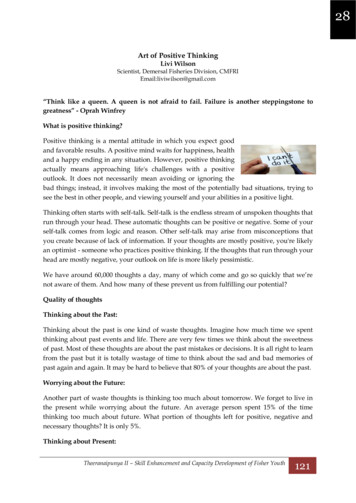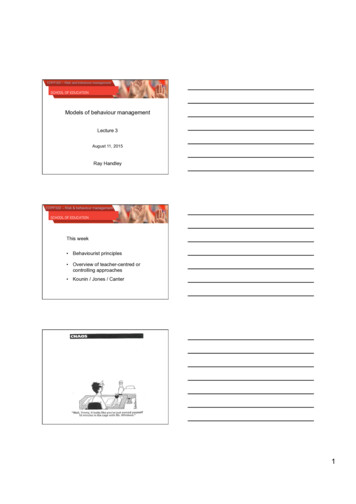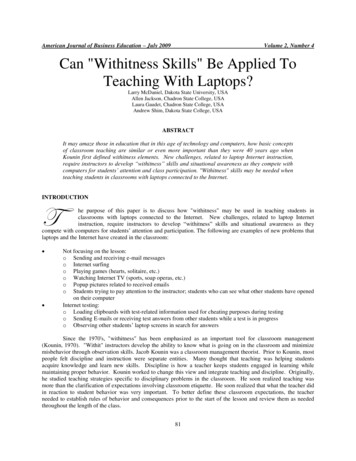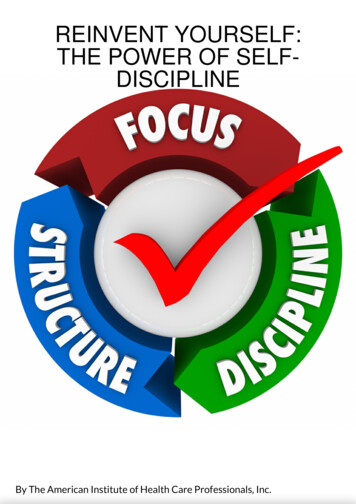
Transcription
Positive Discipline:A Guide for Parents
Copyright 2009, Regents of the University of Minnesota.All rights reserved.
Table of ContentsIntroduction.3Discipline.5Discipline Is TeachingBabies (Birth to 18 months).9Development and DisciplineGaining Confidence as a ParentWhen Babies CryHelping Children SleepToddlers (18 months to 3 years) .17Development and DisciplineGetting Into EverythingWhen Toddlers Should Not TouchTantrumsThey Think They’re in ChargeBitingToilet TeachingSharingPreferring One ParentMaking a MessThey Can’t Sit StillPreschoolers (3 to 5 years).31Development and DisciplineBedtime BattlesThe Picky EaterPower StrugglesWetting the BedWhiningGrade School (5 to 9 years). 41Development and DisciplineWhen Kids Break RulesLyingSibling BattlesBad LanguageTalking BackAbout Spanking . 48Anger.52Time Out.54Resources for Parents.57Credits.58
Dear Parents:Being a parent is the most important job youwill ever have! Parenting will affect not only yourchild, but also you as a person. Parenting comeswith many rewards and challenges. You have theopportunity to influence the type of person yourchild becomes, receive many smiles and hugsand kisses, laugh often, play, and watch your childgrow and develop. You also often will wonder ifyou said and did the right thing, or could havedone things better.Parents love their children and want the bestfor them. However, children don’t come withdirections and don’t always respond or behavethe way you want them to. Sometimes, just whenyou think you have figured things out, your childmoves into a new stage of development and whatworked before doesn’t work anymore. The newstage brings you new joys and challenges.Positive Discipline: A Guide for Parents givesyou information and tools to help with commonparenting experiences you may have from thetime your child is an infant through the earlygrade school years.The strategies in this booklet promote positivedevelopment in children and positive parent-childrelationships. We do not recommend spanking.Spanking does not promote positive development4
and can lead to other problems. Children whoare guided by methods other than spankinggenerally have better mental health, feel betterabout themselves, and are less stressed. Goodhealth is what we are trying to achieve. Thereare many strategies other than spanking thatpromote positive development, and help a childlearn self-control, what is expected, and how tobehave appropriately.There are many other resources in yourcommunity and neighborhood to help you withpositive discipline—your child’s doctor andteacher, the public health nurse, the CooperativeExtension office, and the early childhood andfamily educator through the public school toname a few.Parenting is a learned experience. People gettheir ideas on how to parent from how theywere raised, books, magazines, newspapers,the Internet, television, workshops, doctors andother family professionals, friends, and familymembers. As a parent, your job is to sift throughthis information and find strategies and supportsthat will work best for you and your child. Thegoal is to become the best parent you can be.Enjoy parenthood!5
Di s ci pl i neDiscipline Is TeachingD i sciplinei s te a chingDisciplinehelps childrenunderstand whatyou expect, howto behave, andwhat happensThe word discipline comes from aLatin word that means “to teach.” Asa parent, you are a teacher. The wayyou discipline your children will helpthem learn.Nurturing your childNurturing is where you need to put most ofyour effort. Children learn best when theyknow they are loved and supported. Hereare some ideas: Love your children, no matter whatthey do. Listen to your children. When they are being good, tell them.when they Expect the best from your children.misbehave.Discipline helps Make sure they are safe—physicallyand emotionally.children be in Be a good role model.control of theirown behavior.Guiding your childChildren need you to help themunderstand what kinds of behaviors youexpect from them and what rules youexpect them to follow. They also needhelp from you to manage their feelings,understand responsibility, and learn howto control themselves. Your child needs toknow what will happen if rules are broken.Here are some ideas: Help your child learn to solveproblems. Show your child how to do things.6
Take your child away from situations your childcan’t handle. Help your child learn how to calm down. Prepare your child for difficult situations. Say “yes” when you can and “no” when you need to. Give your child a chance to do it the right way.Responding to your child’s misbehaviorWhen children misbehave, there is usually a reason. Theymay be tired, hungry, frustrated, seeking attention, orwanting control. If you can figure out what is causingthe misbehavior, you will have more success respondingto the misbehavior and preventing the behavior inthe future. For example, if you observe your sevenyear old always having meltdowns when getting homefrom school, then you need to think about what mightbe causing the meltdowns. Perhaps your child is tiredand hungry at the end of the day, or something wasfrustrating at school. Talk to the teachers to see howschool is going. Try to have a nutritious snack and providesome quiet time reading or playing a game to help yourchild make the transition from school to home.Other strategies to consider: Take away a privilege and give the child a chore to do. Firmly tell your child that what he or she did was notappropriate. If something is damaged, expect the child to fix it,make a new one, or help pay for a new one. Use a “time out.” Let children safely experience the consequences oftheir actions.7
P arent Q uestionWhat does “consequence” mean?A consequence is a result of something aperson does. When children misbehave,parents need to respond in a way that helpsthem learn about the effects of their behaviorand how to plan differently for the next time.Consequences should give a child the chanceto be forgiven. A consequence is moreeffective than pain, fear, shame, or humiliation.Parents must decide whether to respondwith a logical or a natural consequence. Anexample of a logical consequence: a childcolors on the wall—the child helps clean thewall. An example of a natural consequence: achild refuses to eat dinner—the child will behungry later.8
Birth to 18 monthsDevelopment and DisciplineInfants come into the world ready to learn and grow. Babies learn through all their senses. They often use theirmouths to explore objects around them. Babies learn to talk by listening and responding to thepeople in their lives. Babies use crying to tell you something is bothering them. Babies need to be loved, safe, and secure.Parents must understand that babies are exploring their worldand learning how others respond to them. Babies do notmisbehave on purpose—they are simply curious!9
P arent Q uestionWhat should I know about disciplinefor my baby? Give your baby lots of love. Remember,you can’t spoil a child with too much love. Never spank or shake your baby. Move your baby when he or she getsinto things that are not okay. Put unsafe things out of yourbaby’s reach. If your infant wants something not goodfor babies, offer something that is okay. Try to have a regular routine toyour baby’s day, especially for eatingand sleeping. When you get tired or things become toomuch for you, find a way to take a break.Gaining Confidence asa ParentIt will take time to feel comfortable with yournew baby. You and your baby need to knoweach other. Every baby is different. It takestime to learn your baby’s eating, sleeping,and attention needs. Keep your days assimple as possible. Try to talk regularly witha friend, family member, or another adultwho cares. If you’re feeling really low, unsure,or frustrated, call your baby’s doctor, or callone of the numbers listed at the back of thisbooklet.10“I felt pretty goodabout being aparent while I wasin the hospitalwith my newborn,but once I gothome, I lost myconfidence.”
P arent Q uestionWhat is “attachment?”Attachment is the strong feelingparents and children have for eachother. Most children who developstrong and secure attachments withtheir parents and other importantadults in their lives grow up to beconfident and caring.When Babies CryCrying is your baby’s way of talkingto you. Your baby will cry because of: Hunger Tiredness Illness Loneliness Wet diaper“Sometimes itseems like allmy baby does is Being overwhelmed with people Stomach gas Being too hot or too cold Needing your love and attentioncry. If I pick myP arent T ipbaby up, will IYou cannot spoil a baby. A babyoften cries less when picked up andcomforted. You cannot hold andcomfort a baby too much. Your babyis learning to trust you and that youwill be there when needed. Withpractice you’ll get to know whatyour baby’s cries are telling you.spoil my baby?”11
“There are times whenmy baby cries reallyhard. And when the criesgo on for a long time,it can make me reallytense and frustrated.”When a baby cries and cries, you need to doyour best to stay calm. First, try to figure outwhy your baby is crying. Try “swaddling” your baby by wrappingyour baby snugly in a blanket and holdingyour baby close.Take a few minutes to relax. Put your baby in asafe place, like a crib with the side up. Then gosomeplace in the house where you can’t hearthe crying, until you feel calmer. Put your baby in a stroller and gofor a walk. Take your baby for a ride in the car. Try “wearing” your baby in a sling or babycarrier. Your body motion and heartbeatcan feel calming to a baby. Try rocking your baby or singing softly. Call a friend.Often, when you can figure out the problemand what will help, crying will stop.Even though you may feel like shaking orspanking your baby, this is never okay. Babies’bodies are very fragile. Shaking or spanking canhurt your baby badly and even cause death.12
Is my baby sleepingthrough the night YET?“Everybody asks me if mybaby is sleeping through thenight. I feel like something iswrong when I say ‘no.’”.P arent Q uestionWhat is “colic” and what can I do?No one knows what causes colic. Colic usuallystarts when babies are three weeks old andmay continue until they are three months old.Most babies outgrow colic. Babies with coliccry loudly, and often cry at the same time eachday. When your baby is crying like this, try tostay calm. Try some of the ideas given in thisbooklet to comfort your baby. Take a break, calla friend, talk to your baby’s doctor, or call oneof the numbers listed at the back of this book.Helping Children SleepNewborns:Most newborns do not sleep through the night.Some babies don’t sleep through the nightconsistently until they are six to nine monthsold. Your newborn baby may need to be fed,changed, and comforted often. Enjoy this quiettime with your new baby. Your baby is nottrying to make your life difficult.13
At 3 months:Babies are able to entertain themselves by gazing at toysover the crib or listening to rattles. They are able to expandtime between feedings to three or four hours and extendnight sleep for longer periods. To help your baby sleeplonger periods at night: Make sure your baby is getting enough to eat duringthe day. Try to increase the last feeding before bed.Keep middle-of-the-night attention short. Just feed yourbaby or change the diaper if it is soiled or very wet.P arent Q uestionWill feeding my baby cereal at bedtime encouragesleeping through the night?No. Most babies cannot digest cereal until they are four tosix months old.P arent T ipBack to sleepPutting babies to sleep on their backs reduces the riskof Sudden Infant Death Syndrome (SIDS). Make sure themattress is firm and fits the crib tightly. Remove quilts,pillows, and soft toys from the crib. Use a sleeper instead ofcovering your baby with a blanket. Do not place your babyon a waterbed, sofa, soft mattress, pillow, or other softsurface to sleep.14
At 7-8 months:At seven to eight months, babies have begun to soothethemselves when they are distressed and settle themselveswhen they are tired. However, they will continue to work on theseaccomplishments. If they are never allowed to soothe or settlethemselves on their own, they likely will become dependentupon others to get to sleep.Help your baby find a way to get comfortable and fallback to sleep without your help. You might want to try oneof the following. Stand by your baby’s crib. You don’t need to pick upyour baby. Gently pat your baby. Talk to your baby. The sound of your voice will let your babyknow everything is okay and it’s time to sleep. Have a bedtime routine including having a quiet bath, readinga picture book, dimming the lights, rocking, or singing. Give hugs and kisses as a major part of the bedtime routine.If you need more ideas, call your child’s doctor or call one of thenumbers at the back of this booklet.P arent T ipStranger anxietyWhen they are seven to eight months old, many babies start togo through a period where they only want to be around peoplethey know well. Understand your baby’s need to be with trustedpeople. Give your baby time to get used to new people—letyour child feel in control. Do not force your baby to be held bysomeone who is not welcomed by the baby. Show your babythat you are a safe haven by understanding the baby’s fears.15
Notes16
18 months to 3 yearsDevelopment and DisciplineToddlers are becoming independent and learning about theworld they live in. Toddlers need to explore, run, climb, taste, and touch.They may get upset when you try to stop them. Toddlers know what they want and will tell you. They canget frustrated when you don’t understand their words. Toddlers watch what others do and copy them. Theywill do what they see you, other family members, andcharacters from television or movies do. Toddlers have minds of their own, but they need you tohelp them when they get frustrated and to protect themfrom danger. Disciplining toddlers means gradually teaching them tocontrol their impulses to touch, taste, jump, run, and climb.17
P arent Q uestionWhat works to discipline my toddler? Give your toddler lots of love. Find things to say “yes” to. Let your child know you’re pleased withgood behavior. Never spank or shake your toddler. Put unsafe things out of your child’s reach. When toddlers want something they can’t have,sympathize with their disappointment or frustrationand interest them in something they can have. Try to have a regular routine to your day. Parents need to be present at all times to serve as“brakes” for exploring toddlers. When you get tired or things become too much foryou, give yourself a break from parenting. Ask yourself whether your child is misbehaving, or justtrying to learn something. If you have made a “bad call” about your child’sbehavior, admit your mistake and apologize. Act the way you want your child to act. If you yell, sowill your child. Make sure you have your child’s attention; be specificand direct when you ask your child to do something. Be realistic about what your toddler can doindependently.18
“Now that mybaby is on themove, how doI teach himnot to toucheverything?”Getting Into EverythingToddlers need you to be with them at all times.You’ve probably noticed toddlers get intoeverything. It is the job of toddlers to explore theirworld. This is how children learn.Here are some ways to make your home a safeplace for your child: Put breakable or unsafe items, including electriccords, out of your child’s reach. Use safety covers on electric outlets. Put safety locks on cupboards and drawers. Use safety gates on stairs and rooms thataren’t safe. Push chairs under tables. When you take something unsafe away, youcan expect your child to be upset. Try offering asafe toy to divert attention.19
P arent Q uestionWhy childproof? It’s important to make surethat anywhere toddlers gois safe. Toddlers need toexplore everything aroundthem. They will touch, taste,roll, poke, and examine allthey can see. This is howtoddlers learn. Help themexplore safely by puttingthings they shouldn’t haveout of reach. You can beginteaching older toddlers notto touch certain things.So what about television? Toddlers need to activelyexplore their environment inorder to grow and develop.Children under the age oftwo years should not spendtime watching television.Television is a passiveactivity. TV does not engagechildren in an active processof learning, moving, orplaying with others. TV isa powerful attraction andparents need to work hardto limit TV time. Find otheractivities to do with yourchild such as reading, artprojects, or playing outside.20“When my childheads for the hotstove, I yell‘No, no, no!’”.
When Toddlers ShouldNot TouchChildren are curious and want to see whatwork you are doing at the stove. Instead ofslapping hands or yelling, pull your childaway and say “No, the stove is hot and willhurt you.”. Children learn when you tell themover and over that things are unsafe.While you wait for learning to take place: Remove the child from the unsafeplace or item. Try to interest the child in somethingelse, such as plastic bowls, pan lids, orwooden spoons.Have a safe place for your toddler to playwhile you’re in the kitchen.P arent T ip“Me do it!”If you have a toddler, you’ve heard this a lot.Usually, “me do it” isn’t a problem unlessyou’re in a hurry. Encourage your child tobe independent. Give chances to put onclothes, brush teeth, and climb into carseats. You will need to allow extra time whileyour child learns to do these tasks, but themore tries, the sooner your child will be ableto do these things and save you time later.21
TantrumsTantrums usually result when a child is tired,hungry, angry, or frustrated. Your toddler mayclench her fists, shut her eyes, and scream. Hemay kick, throwing himself to the floor, and makea real scene.Try to prevent tantrums from happening. Makesure your child gets enough sleep. Avoid takingyour child someplace when the child is hungryor tired. If you don’t have a choice, bring alonghealthy snacks, books, favorite toys, or crayonsand paper to keep your child from becomingbored and upset.Why are tantrums so common at this age? Toddlers are curious. They don’t understandwhy they can’t always touch, taste, andexplore everything around them. Toddlers usually can’t tell you inwords what they want. This canmake them angry. When toddlers are hungry, tired, hot,uncomfortable, or want attention, they oftenreact with strong emotions.Tantrums are normal. Let your child have thetantrum, as long as she is safe and no one elseis being hurt. Let your child know you understandhe is upset.22
When you are at home, stay calm and ignorethe tantrum. When you are in a public place, stay calm andremove the child. Go to a quiet place untilyour child can calm down. Some children have trouble calming down.Hold your child gently, talk softly, and explainthat everything will be okay.No matter where you are, the tantrum will endsooner if you respond calmly.When a child has a tantrum in a public place, youmay be tempted to avoid a scene by giving yourchild what he or she wants. When parents do this,children learn that they can get what they want ifthey kick and scream enough, and you will havemore tantrums in the future.P arent T ipTry distractionA way to guide a small child’s behavior is to directthe child’s interest somewhere else. If your childwants something you don’t want the child to have,give a safe toy to play with. If your child movestoward an open stairway, take your child to adifferent part of the room.23
They Think They’re in Charge!By age two, children start to know they can dosome things on their own. They are excitedabout their new skills and want to use them!Here are some ways to help you and yourtoddler practice new skills: Give choices when you can. Ask, “Do youwant to ride in the shopping cart today ordo you want to walk?” Plan extra time so your child can do thingsindependently. This will result in less stressfor you and your child. Allow child to get in the car seat alone.Ask if help is needed. Stick to important rules. Then your childwill be safe and know what to expect. Forexample, children have to ride in the carseat; it isn’t a choice.P arent T ipAvoid power struggles – no one winsYour toddler is trying to test out new skills andwants control. Parents are in a hurry and alsowant control. Parents need to have patiencewith toddlers and create ways for them to havecontrol so they can learn about themselves andhow they influence their surroundings. However,there are times when you need to say “no” foryour child’s safety such as, “You have to holdmy hand when we cross the street.”.24“My sweet littlebaby has turnedinto a bossychild, refusingto do anything Isay. The reply to‘Please sit in theshopping cart(or car seat).’ isalways ‘No!’”
Biting!“I don’t knowwhat to do.The other daymy toddler bitanother child.”It is very common for toddlers to bite, kick, andhit other children. Toddlers get excited andoverstimulated and biting can be the result. Whenparents react excitedly, a child may learn to usebiting to get attention.Here are some ways to prevent biting: Watch your child and look for signs of overstimulation. Remove your child from thesituation and help the child calm down. Toddlers get angry and frustrated when theyare hungry and tired. If this happens often,try to change the child’s eating and sleepingschedule, or keep your child away from otherchildren during these times. Comfort the child who has been bitten. Talk with others who take care of your childabout other ideas and suggestions. Try to learn what prompted the biting. Youngchildren have few skills to solve problems withother children.If your child bites, tell the child firmly that bitingisn’t okay and take your child away from the otherchildren. Help your child to think about how theother child feels and to consider ways to say“sorry.” Never bite your child back. This does notteach a child to stop biting and it may make thebiting worse.25
Toilet TeachingYou can encourage toilet teaching, but don’trush it. Often parents are ready for toiletteaching before their child is. Your child maybe ready to start toilet teaching when: Your child tells you, “I need to go to thebathroom.”. Your child tells you about a wet orsoiled diaper.Most children do not understand their “needto go” until they are three years old. A twoyear-old may start toilet teaching, but may notbe fully trained until age three or even older.Do not punish or shame a child for wetting orsoiling diapers or underwear. Doing so canmake the child feel bad about something thatcannot be controlled, and may make toiletteaching take longer.P arent T ipStaying dry Usually around age two, a child can start tolearn about toileting. By age three-and-a-half many, but not all,children are able to stay dry while awake. By age five many, but not all, children staydry at nap time and through the night.26“I worry that Ishould be doingmore to helptoilet train mychild.”
Sharing“I am so tired oftrying to get mytwo-year-old toshare.”Sharing is not something most two-yearolds understand. Your child won’t begin tounderstand sharing until three or four years ofage. The more you push sharing at age two,the more your child may refuse and the morefrustrated you may become. Here’s what youcan do: Praise your child for sharing. Show how to share by sharing some ofyour things with your child. When children are playing together, makesure there are plenty of toys for all thechildren to use.Your child will begin to catch on that sharingis a good thing.Preferring One Parent“My child won’tallow anyonebut me to help.”It is normal for toddlers to go through a stagewhen they prefer one parent over the otherparent. However, a parent may find it stressfulto be the only one allowed to do things for thechild, such as put on shoes, get food, or getready for bed. Try not to make it a big issueor take this behavior personally. Continue withboth parents interacting positively with the childand with the help of the “preferred” parent, thebehavior will soon change.27
Making a MessToddlers need constant supervision. Toddlerswant to touch, taste, see, and exploreeverything. This is how toddlers learn abouttheir world. Try to keep messy items out ofreach. Give toddlers safe places to explore. Toddlers don’t make messes to make youangry. They make messes because they arelearning how things work. Don’t ignore the mess your child made.This is the perfect chance to teach aboutcleaning up messes. Show your child howto help you clean up.P arent T ipKeeping track of your toddlerIt’s important to always know where yourtoddlers are and what they are doing. Atoddler’s job is to explore. Your job is to makesure your child is safe. Keep a constant eye onyour toddler and put things you don’t wantyour child to have out of reach.28“The other daymy 2 1/2-yearold pouredchocolate syrupall over the livingroom carpet. Iwas so angry andI didn’t knowwhat to do!”
My Toddler Can’t Sit Still“Why can’t mytwo-year-oldever sit still andbe quiet?”Toddlers aren’t supposed to sit still or bequiet for very long! You toddler is curious,needs to move, and loves to run and jump!Toddlers enjoy talking, sometimes loudly, toyou and others.There are times when you do need your childto sit still and be quiet. Here are some thingsyou can try: Bring small toys or picture books to giveyour child something okay to do. Bring a snack that isn’t too messy, suchas crackers, fruit, or cheese. Give your child as much attention asyou can. Point out objects in the room to divertyour child’s interest. Play patty cake or other games. Make sure there is active time beforeyour child must sit still. In some situations, you and your childcan move to a place where you won’tdisturb others.If you have other questions about your child’sdevelopment at this age, talk to your child’sdoctor or call one of the numbers at the backof this booklet.29
Notes30
3 to 5 yearsDevelopment and DisciplinePreschool-age children live in the present. They are excited abouteverything they can do and what they know. Usually they like beingwith other children, pretending, and trying to do what adults and oldersiblings do. At the same time, they want to be your baby. Preschoolers may insist on doing things for themselves, even whenthey don’t know how. Preschoolers will test the rules and argue about rules they don’tagree with. Preschoolers have great imaginations! They tell creative storiesand may be afraid of the dark, animals, monsters, and more. Preschoolers enjoy being in charge and telling others what to do. Preschoolers watch you closely. Your actions teach them far morethan your words. Preschoolers want to please you. Preschoolers need your love.31
P arent Q uestionWhat are the best ways to discipline mypreschooler? Give your child lots of love. Put unsafe things out of your child’s reach. Try to have a regular routine to your day. Ask yourself: Is my child misbehaving or justtrying to learn something? Act the way you want your child to act. Be specific and direct when you ask yourchild to do something. Be realistic about what your child can do. Spend time with your child; especially playtime where your child gets to be in charge. Catch your child being good, and let yourchild know you noticed. Prepare your child for occasions that maybe upsetting. When your child is having a difficult time,help your child take a break or a “time out.” Explain the rules and what will happen if therules are broken. Be consistent. Follow through with whatyou say.32
P arent T ipBe prepared for difficult situationsIf you dread taking your preschooler to the clinic,grocery store, or other places where your childmight misbehave, here are some things to try: Before you go, talk to your child about thebehavior you expect. For example, say “Youmust stay in the grocery cart, and not ask forthings in the store.”. Try not to take your child places when youknow your child will be tired or hungry. Bring along snacks and toys. If your child has trouble when you’re in thestore or clinic, give a reminder about the rules.Ask your child to say what the rules are. Let your preschooler know how proud you arewhen you see good behavior.Bedtime Battles“Bedtime is sostressful at myhouse. By thetime I get mychildren to bed,I’m too tiredto do anythingelse.”One of the best things you can do for yourself andyour child is to set a bedtime routine. Decide what time your child should go to bed. Start your routine about 30 minutes to an hourbefore bedtime. The child’s routine may include a bath, a lightsnack, brushing teeth, and story time. This isnot a good time to start playful wrestling oraction games. Try to stick to your routine every night.33
P arent T ipIs your child afraid of the dark?Talk with your children about their fears. Children’s fearsare real. Do not make fun of them or say they aren’t real.Place a night light or small lamp in the room, or leave ahallway light on until your child falls asleep. Some childrenfeel more secure with a special blanket or stuffed animal.Helping your child learn to deal with fea
Positive Discipline: A Guide for Parents gives you information and tools to help with common parenting experiences you may have from the time your child is an infant through the early grade school years. The strategies in this booklet promote positive development in children and positive parent-child relationships. We do not recommend spanking.










